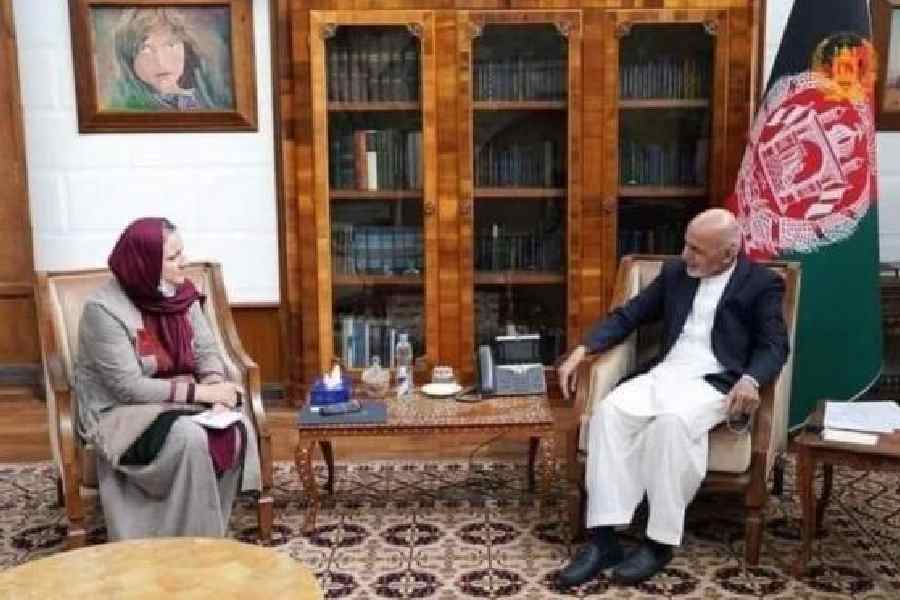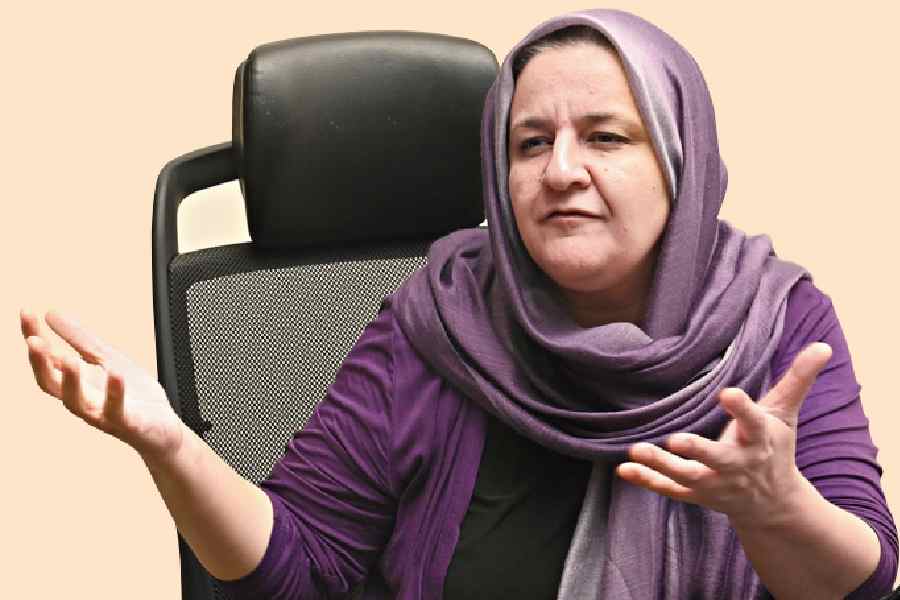She describes herself as “a refugee of three times” in the 47 years of her life. “The first time I was kicked out was as a child from Afghanistan, the second time when I was a young girl from my adopted home Pakistan, and the third time in 2021, again from Afghanistan, years after I had chosen to come back to my home country from the United States.”
Speaking on stage at the International Institute of Hotel Management Global Campus in Sector V, Rangina Hamidi betrays none of the emotions that such repeated upheavals must have subjected her to.
After her latest flight, occasioned by the Taliban takeover in 2021, she joined the Thunderbird School of Global Management in Arizona as professor of practice where she teaches women and leadership “from a practical perspective”.
She fits the job profile, having been the education minister in Afghanistan for 14 months, till the fateful August 15 in 2021 when Kabul fell to the Taliban. “The President (Ashraf Ghani) had offered me the job as as he wanted to depoliticise education in Afghanistan. I was not a politician and it took him eight days to convince me to join the cabinet,” she recalled. There were three other women ministers - in the women’s affairs, communication and economy departments. “But I was the first woman ever to be appointed education minister.”
At the time she was leading a women weavers’ collective she had founded, called Kandahar Treasure, a work she continues to this day, and running a school.
“I was hesitant to take up the President’s offer but my friends made me consider it. I realised that the men who had been in office before me were hardly better qualified. I was at least running a school (Mezan International School) that the President said he had heard of.”
She had started the school when her daughter attained school-going age. “I realised that the school that I wanted her to attend did not exist. So I built one. It became popular quickly.” The President said he wanted her vision to guide education for the entire country. “But the shift from managing a school of 35 people to leading a 270,000-strong staff across 34 provinces was daunting. Yet when the President asked: “The future that you believe in for your daughter, don’t you want that future for millions of children in Afghanistan?” I could not say no.”
Hamidi says she had to develop “nerves of steel” to do her job, as a woman and as a person from an apolitical background.
Paths less trodden
But she had never shied from acting according to her convictions. The first act was her decision to cover up even while she was a student in the US. She lauded Indian women for wearing the sari. “It shows how proud you are of your culture. There is nothing wrong to look different, to feel different, to act different,” she urged the students.
Later, speaking to The Telegraph Salt Lake at a Bypass hotel, Hamidi said she chose the path least travelled by going back to her birth country in 2003 and work with women. “Typical Afghan refugee girls grown up in America were all on the track to join Fortune 500 companies and my distant family members thought I was crazy to want to return to a war-stricken country in poverty and without education when I was living the dream of life in America.”
But her parents were supportive of her decision just as they were when she had decided to enroll in the University of Virgina, which would entail boarding in a hostel. “When a male relative, who was staying longer in the US than us, warned my father that I might indulge in practices against our culture in a hostel, he responded that he was the one at risk of getting a bad name, not him.”
The Hamidis were five sisters, Rangini being the fourth. “I was my father (Ghulam Haider Hamidi)’s favourite. When we were crossing over to Pakistan in 1981, I was in his lap. It was dawn and we were crossing through the mountains as the communist regime would attack us if they saw us flee. My dad’s cheeks were warm. Later on, I realised those were his tears. He was having to leave home, not knowing if he could return.”
Hamidi has no complaints about life as an infant in Pakistan. “My father did not allow us to live in a refugee camp. He hated rations. So he worked hard. My older sisters and mother started a sewing business to supplement my father’s income.” The family left for the US and from Grade IV, Hamidi was a student in the US.
She was studying to become a doctor, but she was more inclined towards religious studies and gender studies. “The sciences were just killing me.” Her father agreed without understanding what gender studies was. “‘Go become a cleaner if you want to but be the best cleaner you can be,” is what he told me.
Face of courage
She graduated with double Bachelors in 2000 and while she took a break, taking up a job while deciding what to do for higher studies, the 9/11 terror attacks happened.
“That day we were in shock and we all went home. I was planning on not going to work the next day. At 8pm, my boss called to say the CEO said I wouldn’t have to show up the next day. I called him back to ask if the office would be shut. He said the offer was only for me and two other Muslim men, one from India and the other from Egypt. The CEO had said we should be careful as people were crazy out there. The next day I went to work, covered. The CEO was passing by my seat and on spotting me, came back to ask if I had not got her instruction. I told her I, like a billion Muslims in the world, had nothing to do with what happened. The action of 10 criminals cannot speak for all of us. She came and hugged me. And I became kind of a symbol is office — that I was not afraid.”
Her decision to return to Afghanistan was made subsequently. She received a training in 2005 from the business school where she now teaches, called Project Artemis, targeted towards Afghan women who were interested in starting their own business. “Thus I started Kandahar Treasure on my return. Today it provides income opportunities to over 2,000 women.” She comes to India often to get raw materials while the Afghan women do traditional embroidery.
It is on seeing her make a difference that her father was inspired to join public life, becoming the mayor of Kandahar. But politics claimed him when a suicide bomber blew himself up in his presence in 2011.
Ten years later, when the Taliban took over, the day was incidentablly her birthday. “My ministry had 60 guards. But when we left the building at 12.15pm, there was not a single one outside. So we did not even bother to close the gate.” Hamidi expressed her shock publicly when the President was heard to have fled the country later in the day.
But soon, she realised that the President’s decision had prevented bloodshed in Kabul.
After eight days, she too decided to leave while the exit routes were still open. “My daughter was 12. I had to think of her future. My family was still dealing with my father’s death. I did not want to contribute to my mother’s trauma. I left telling myself that being a US citizen, I could return if the doors did not shut. That made the decision easier.”
Hamidi has indeed returned twice to Afghanistan in recent times. She believes that the Taliban would have to change as the Afghan society has changed a lot since their last regime in the late 90s. “Some things have remained the same, like the space for women entrepreneurs. But the West’s coverage of Afghanistan completely strips Afghan women of any agency!” she says, aghast.

Rangina Hamidi with President Ashraf Ghani discussing matters related to her ministry
The Taliban’s views on women’s education remains the same, though. Girls are allowed to attend school but only till Class VI, except for nursing and para-medical training. The girls who were in para-medical classes are continuing by attending classes online. “But at some point, the supply line will dry up. They cannot expect girls to jump to nursing school straight from Class VI.”
“It’s been two years now since they took over and the West is simply watching. They might watch for another 20 years, but in the meantime, the Afghan people have to live,” she exclaims.
